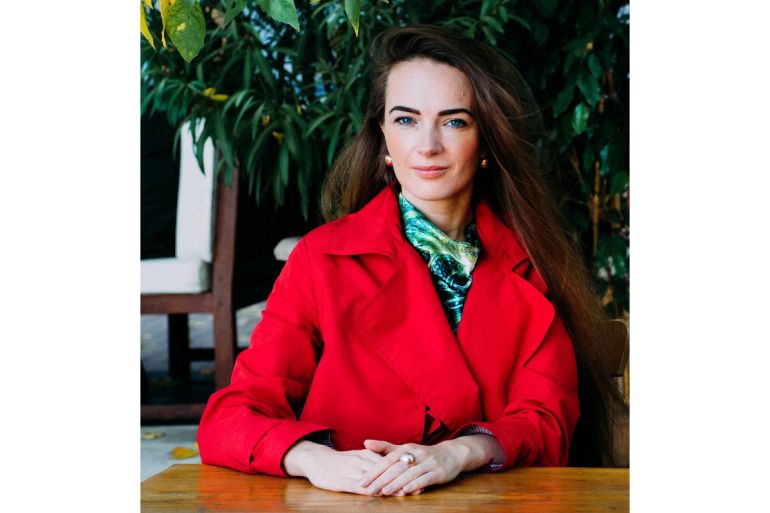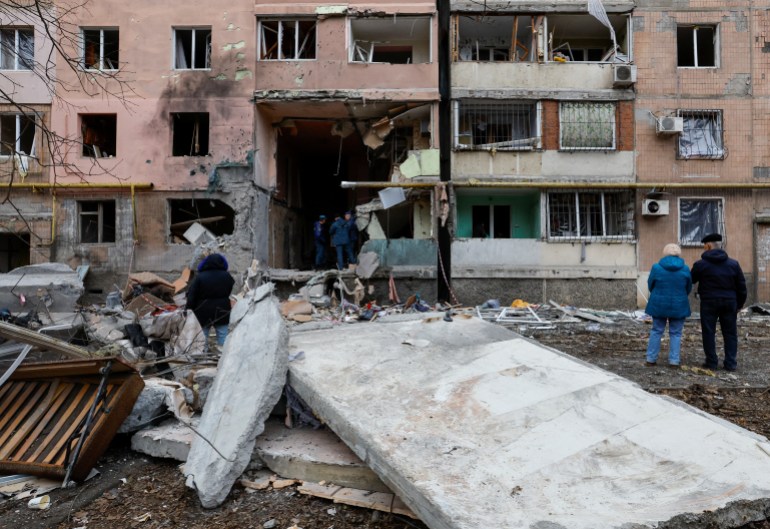‘World did nothing’ after Russia annexed Crimea: Nobel laureate
Oleksandra Matviichuk, who runs Ukraine’s Center for Civil Liberties, says international criminal law needs to help Ukraine now, not after the war.

Ukraine seeks to do something the world has never done: try a country’s leaders for aggression they are in the midst of committing.
“A lot of politicians still look at the world through the prism of the Nuremberg Trials, where Nazi officials were tried but after the Nazi regime had collapsed, and the narrative is, ‘Let’s wait until the end of the war’,” said Oleksandra Matviichuk, director of Ukraine’s Center for Civil Liberties, which won the Nobel Peace Prize last year.
Keep reading
list of 4 itemsSpanish PM to talk Ukraine war and peace with China’s Xi Jinping
Ukraine receives Leopard, Challenger battle tanks
Russia-Ukraine war exposed human rights ‘double standards’
“I believe it’s the wrong narrative because justice must be independent of [countries’] geopolitical interests and justice must be independent of the magnitude of the Putin regime’s power,” she told Al Jazeera, referring to Russian President Vladimir Putin.
“We cannot wait. We must establish the tribunal now and hold his regime accountable.”
The reason for doing this is not merely moral but also practical, said Matviichuk, who has directed the centre for 17 years, including the nine years since Russia’s invasion and annexation of Crimea. That time was dominated by a simmering conflict between Russian-backed rebels in Ukraine’s eastern provinces of Luhansk and Donetsk and Ukrainian government forces.
“When I spoke with victims of the war these past nine years, they told me that their perpetrators were totally confident that they will remain unpunished,” she said.

“When we start – just start – legal proceedings, they can create doubt, not among all but in some part of [the] Russian [military] that, ‘We don’t know what the future will be. … Even if Russia will protect Putin, maybe it won’t protect me because I’m not so significant as Putin’, and this doubt can make a cooling effect to the brutality that is going on daily,” she told Al Jazeera.
“This doubt can save a lot of lives.”
There is evidence for this view.
In September, Ukraine’s military intelligence intercepted conversations revealing that several Russian pilots were thinking of absconding to South America to avoid international criminal tribunals.
They made the remarks as an international legal noose was slowly tightening around Russia and its president.
This month, an independent commission of inquiry acting for the United Nations Human Rights Council found that Russian authorities have committed “numerous violations of international humanitarian law”, including “wilful killings, torture, inhuman treatment, unlawful confinement” and “rape“.
The Center for Civil Liberties says it has documented 34,000 such crimes and Ukraine’s prosecutor general has found up to 77,000.
On March 17, the International Criminal Court (ICC) in The Hague indicted Putin “for the war crime of unlawful deportation of population (children)” to Russia.
It was the ICC’s first arrest warrant issued for crimes allegedly committed during the war in Ukraine.
Ukraine says it has confirmed the abductions of more than 19,000 children and believes this policy is part of an attempted genocide.
Russia denies the allegations.
“Putin says Ukraine has no right to exist – there is no Ukrainian nation,” Matviichuk said.
“Along with the interpretation of this statement by Russian propagandists, who say Ukrainians have to be either re-educated or killed, the prohibition of the Ukrainian language, culture, history, in occupied territories and the extermination of Ukrainian elites there – priests, journalists, local mayors, deputies, human rights defenders, volunteers, active people of the territorial community – all this together shows us this genocidal policy,” she argued.
Although Putin withdrew Russia from the ICC in 2016, it has jurisdiction over crimes committed on Ukrainian territory because Ukraine accepted it in 2013.
But pursuing the crime of aggression is a difficult matter.
Crimes against humanity and war crimes committed on Ukrainian territory fall under ICC jurisdiction but due to the increased jurisdictional complexity of indictments for aggression, that crime does not.
“Countries are much more wary of giving the ICC jurisdiction over the decision to go to war,” an international legal expert told Al Jazeera on the condition of anonymity. “It’s just a question of control.”
Even among the 123 countries that have accepted broader ICC jurisdiction, many have not accepted jurisdiction for aggression.
ICC referrals for aggression also need to be cleared by the UN Security Council, where permanent members China and Russia would likely veto them.
Ukraine is on a mission
Nonetheless, Ukraine has set out to do nothing less than re-establish the world system of peace and security.
“We must become a locomotive for changes in approaches to international law,” Ukraine’s deputy defence minister, Hanna Maliar, said this month.
“International judicial institutions, which were supposed to prosecute, are not working,” she said. “After the Nuremberg trials, no one was prosecuted for aggression.”
She said neither sanctions nor negotiations under conflict conditions have been effective.
“None of this will stop Russia … Let’s find some mechanism that will prevent wars in the world.”
Matviichuk echoed that view.
“We now work under circumstances where the law doesn’t work at all,” she said. “The entire UN system couldn’t stop Russian atrocities.”

Ukraine has settled on what some might describe as a Quixotic course of action – to go around the UN Security Council and appeal directly to the General Assembly (UNGA).
A two-thirds majority there, Matviichuk said, could ratify an indictment against Putin for the crime of aggression.
That means Ukraine would have to sway 129 out of 193 members.
So far, Matviichuk said, only 40 countries have backed the idea, but she is undeterred.
“It will be a push for the next level of development of international criminal justice and international law itself,” Mativiichuk said.
That is still virgin legal territory.
“It’s hard to say if the two-thirds majority in the UNGA is a legal rule,” the legal expert said. “The rules are currently unsettled.”
But like Ukraine, the ICC is taking a maximalist legal stance.
“The ICC has taken the view that there is no immunity for heads of state before it and that a state that is party to the Rome Statute is obliged to arrest a head of state of a non-party,” the expert said.
Is the world complacent?
Like many Ukrainians, Matviichuk believes the world was slow to realise the full implications of Putin’s actions.
In 2014, when Russia annexed Ukraine’s Crimean Peninsula and armed a separatist movement in Donetsk and Luhansk, the European Union and United States responded with selective sanctions against banks and oligarchs but did not ban imports of Russian oil and gas or help Ukraine militarily.
Three years later, Russia’s military presence in Syria grew, helping the repressive administration of President Bashar al-Assad.
Ukraine feels it is the victim of these failures to stand up to Russia and refuses to be the third failed test of the world’s resolve.
“Because Russians enjoyed impunity in Syria, they started this war in Ukraine,” Matviichuk said.
“Crimea was a test because it was the first time since the Second World War that a country annexed a part of another country and the world did nothing,” she said.
When Russia launched a full-scale invasion of Ukraine in February last year, the Western world did act, but it took a year for the most painful sanctions – a ban on Russian oil imports and a price cap on oil sales to third parties – to kick in.
This, Matviichuk said, was because “even within countries that support Ukraine, there are politicians who want to return to business as usual“.
That was her polite way of saying they do not wish to sacrifice economic benefits for values, a criticism levied particularly against Germany for backing the Nord Stream 2 gas pipeline, which was to have delivered Russian gas to Europe’s biggest economy.
Ukraine’s latest move is to try to remove Russia as a veto-wielding permanent member of the UN Security Council.
Critics say such an ostracism would be legally difficult and politically dangerous, but whether it works may be besides the point.
As Matviichuk puts it: “Putin tried to convince the whole world that rule of law, democracy and human rights are fake values and a state with a strong military potential and nuclear power can dictate their rules.”
Presenting its cause as a clash of good versus evil along with achieving significant victories on the battlefield has helped Ukraine cement an alliance stretching well beyond NATO and not seen since the Second World War.
Matviichuk hopes that having come this far, that alliance will see Ukraine as the cause that brings the UN Charter into full effect for the first time.
“We Ukrainians have a sense of urgency,” she said. “Time for us has resulted in numerous deaths. … We feel the urgency of the restoration of international order.”